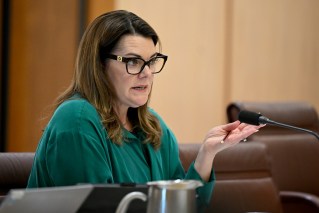Anthony Albanese promises change at home and abroad as Labor heads for majority

Labor is on track to claim government in its own right as incoming Prime Minister Anthony Albanese promises Australia a moment of change and a renewed image abroad.
Labor securing simple majority of 76 seats or a one-seat lead were shaping as likely election outcomes after counting on Sunday as the party pulled ahead in Bennelong, Deakin and Lingiari but was slightly behind in Gilmore.
The Labor leader will be sworn in as the nation’s 31st Prime Minister on Monday alongside four front benchers to establish an interim cabinet before he flies to Tokyo for security talks the following day.
Mr Albanese said on Sunday a critical security summit and bi-lateral meetings with the leaders of Japan, the United States and India, a grouping known by the abbreviation the Quad, was also a step toward a diplomatic reset: “It enables us to send a message to the world that there is a change of government.”
That would include a plan to communicate differently with the world about climate change, Mr Albanese said.
Late on Sunday Mr Albanese had his first phone call with President Joe Biden. The President said he hoped to deepen Australian-American ties and expressed appreciation for Mr Albanese’s decision to attend the Quad on short notice.
Projections suggest that the incoming PM will need to govern with support from a Senate with a progressive cross bench holding the balance of power including 12 Greens and the likely addition of climate candidate David Pocock.
Greens leader Adam Bandt said the party would push Mr Albanese for faster climate action.
The Quadrilateral Security Dialogue is a key grouping formed to counterbalance China’s regional power, an issue of increasing concern for Australia as relations with Beijing deteriorated under the Coalition.
Rhetoric rebounds
The previous government’s hardline rhetoric on China, including a statement by outgoing Defence Minister Peter Dutton that the country should “prepare for war” has emerged as a key factor in its thumping election defeat.
Votes shifted on the issue in several seats but particularly in Western Australia, where a near 11 per cent swing delivered Labor Hasluck, Pearce, Swan and Tangney.
The government’s statements on China pushed voters to Labor including in Tangney, where Asian-Australian voters deserted the Coalition.
Research suggested core Liberal voters in higher-income electorates such as Curtin, which fell to an independent, had nuanced views on Chinese relations and enjoyed the fruits of a trading relationship.
“They thought the government’s behaviour was moronic,” one Labor source said.
In New South Wales, Labor detected a similar effect in key marginal seats with significant Chinese Australian populations, such as Reid and Bennelong.
A big moment
Mr Bandt said the election had delivered a mandate for action on climate change and promised to push accordingly: “Voters have made it clear they want the Greens to push the Albanese government to go further and faster on climate change and inequality”.
Mr Albanese must also turn his mind to two vacant front bench portfolios after Labor shadow ministers Kristina Keneally (home affairs) and Terri Butler (environment) lost their seats.
“The caucus and the normal processes will operate the week after next,” Mr Albanese said.
The Labor leader appeared with partner Jodie Haydon and his poodle, Toto, in an outing in Marrickville in his Sydney electorate, the first since he claimed victory on election night.
“It was a big moment last night and it’s something that’s a big moment in my life, but I want it to be a big moment for the country,” he said.
“I want to change the country; I want to change the way politics works in this country.”








